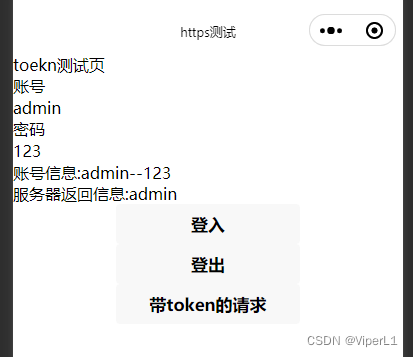[小程序]基于token的权鉴测试
发布时间:2024年01月21日
一、服务器配置
? ? ? ? 服务器基于flask,需要额外安装flask_jwt_extended包
from flask import Flask #导入Flask包
from flask import request
from flask import jsonify #用来返回json消息
from flask_jwt_extended import create_access_token, jwt_required, JWTManager, get_jwt_identity #权鉴相关app.config['JWT_SECRET_KEY'] = 'super-secret' #初始化密钥
jwt = JWTManager(app)
users = {
'admin': '123',
}? ? ? ? 定义一个POST接口供小程序端获取token?
@app.route('/login', methods=['POST'])
def login():
account = request.json.get('account', None)
psw = request.json.get('psw', None)
if not account or not psw:
return jsonify({"msg": "缺少用户名或密码"}), 400
if account not in users:
return jsonify({"msg": "未找到用户"}), 404
if users[account] != psw:
return jsonify({"msg": "用户名或密码错误"}), 401
token = create_access_token(identity=account)
return jsonify(token=token), 200? ? ? ? 定义一个需要token的GET请求来验证效果
@app.route('/protected', methods=['GET'])
@jwt_required()
def protected():
current_user = get_jwt_identity()
return jsonify(msg=current_user), 200二、效果程序实现
? ? ? ? 1.获取并存储token
login(e){
var that = this
wx.request({
??????url:'请求链接',
??????method:'POST',
??????data:{ //POST账号密码
account:that.data.account,
psw:that.data.psw,
??????},
header: {'Content-Type': 'application/json'},
??????success(res)?{
wx.setStorage({key:'token',data:res.data.token}) //存储token
??????},
fail(res){console.log(res)}
????});
},? ? ? ? 大体思路是:使用POST指令向服务器提交账号和密码,并从服务器收到token字符串,然后将token字符串存在本地。
? ? ? ? 2.发送带token的GET
privatePost(e){
var that = this
wx.request({
??????url:'链接',
??????method:'GET',
header: {'Content-Type': 'application/json',
'Authorization':'Bearer '+wx.getStorageSync('token')}, //构建token头
??????success(res)?{
that.setData({msg:res.data.msg}) //显示返回信息
??????},
fail(res){console.log(res)}
????});
},? ? ? ? 这段代码和普通GET指令唯一的区别在于其在header中设置了一个Authorization属性。如果使用Flask服务器请务必按照这个格式构建header。
? ? ? ? 3.登出
? ? ? ? 这个更简单了,直接把本地存储的token删了就好了
logout(e){
wx.clearStorage('token')
},效果如下图:

文章来源:https://blog.csdn.net/weixin_37878740/article/details/135734823
本文来自互联网用户投稿,该文观点仅代表作者本人,不代表本站立场。本站仅提供信息存储空间服务,不拥有所有权,不承担相关法律责任。 如若内容造成侵权/违法违规/事实不符,请联系我的编程经验分享网邮箱:chenni525@qq.com进行投诉反馈,一经查实,立即删除!
本文来自互联网用户投稿,该文观点仅代表作者本人,不代表本站立场。本站仅提供信息存储空间服务,不拥有所有权,不承担相关法律责任。 如若内容造成侵权/违法违规/事实不符,请联系我的编程经验分享网邮箱:chenni525@qq.com进行投诉反馈,一经查实,立即删除!
最新文章
- Python教程
- 深入理解 MySQL 中的 HAVING 关键字和聚合函数
- Qt之QChar编码(1)
- MyBatis入门基础篇
- 用Python脚本实现FFmpeg批量转换
- django和vue的学生宿舍管理系统(程序+开题报告)
- SpringAOP复习
- 初识C语言(C语言笔记,简述C语言的部分知识点)
- [C语言]百行代码实现通讯录(进阶篇)
- 在Excel中,如何简单快速地删除重复项,这里提供详细步骤
- React中对UI组件化的步骤和设计原理
- Ubuntu 22.04 LTS上安装Docker-ce
- 技术博客:市面上加密混淆软件的比较和推荐
- 一文了解JavaScript的数据类型
- Shell脚本通过渗透测试检测服务器安全!